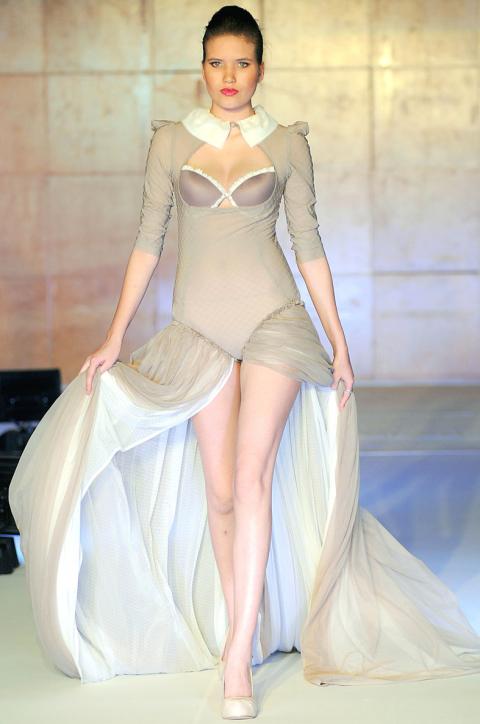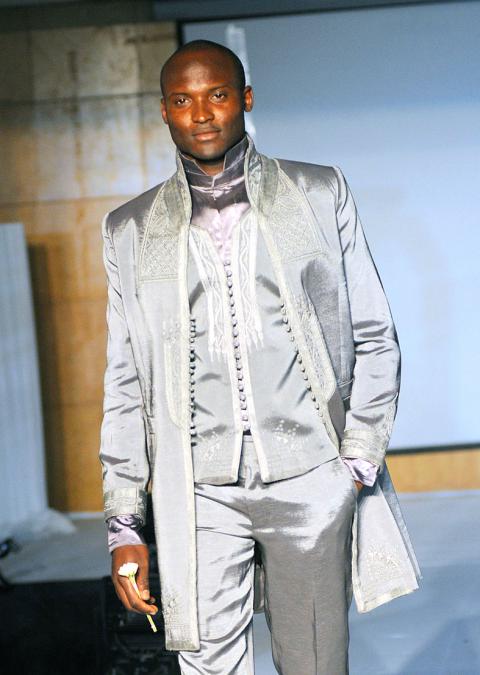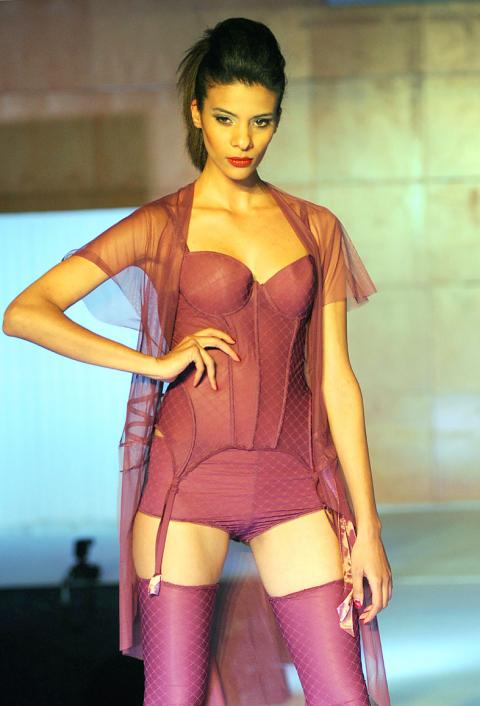As designers unveiled their latest creations at Tunisia’s first fashion festival, experts from the country’s embattled textile sector studied ideas to revive the flagging industry.
“Our main goal is to enhance the sector’s image and offer a welcoming place for people to swap ideas on how to start partnerships ... and encourage new creative talent,” said Samir Ben Abdallah, organizer of last week’s festival.
At the two-day event, models decked out in creations of young Tunisian designers strutted their stuff in front of international industry experts, artists and fashion addicts.

Photo: AFP
However, in the conference halls, talk turned to the economy, since the Tunisian textile and clothing sector has been badly hit by the financial crisis sweeping its main clients, notably France.
Combined with the climate of insecurity that followed Tunisia’s January 2011 revolution, foreign investors have proved reluctant to plough fresh funds into the country.
“A handful of foreign investors are prepared to launch projects here, but they are waiting to see stability return to the streets,” Technical Centre of Textiles director general Samir Houet said.

Photo: AFP
About 70 Tunisian textiles firms have had to shut their doors since the revolution, he said.
The industry’s current structure has added fresh challenges, with Tunisia failing to keep up with changes in the sector such as cheaper labor costs in other countries and fluctuations in demand from Europe.
“The industry in Tunisia is in a very fragile state today. Its main handicap is its dependence on exports and its main clients who have undergone have upheavals,” said Francois-Marie Grau of France’s clothing industry union.

Photo: AFP
Out of the more than 2,000 Tunisian textile and clothing businesses, 1,700 deal only in exports, essentially working as subcontractors for larger distributors.
Moreover, the model has seized up, as shown by a 7.9 percent drop in exports last year from the year before, official statistics show.
Tunisian businesses “should seek growth opportunities where they are: in markets outside Europe where growth is still strong,” Grau said.
Tunisia’s textile manufacturers could also try to expand the range of products they offer, moving away from cheap clothing, said Daniel Harari, director-general of multinational fashion firm Electra.
“Tunisia should not compete on production costs alone, but it should work to improve its service quality and develop new skills,” he said.
For Harari, creativity and initiative in the industry are essential if it is to move away from simple subcontracting.
Seyf Dean Laaouiti, a 25-year-old Taiwanese-Tunisian designer, wants just that.
He dazzled the jury at the show with 14 outfits designed around the theme of “culture shock,” and dreams of winning worldwide renown for his Narcisso Domingo Machiaveli range.
“This festival is a chance for young talent to come out of the shadows and to express themselves and show off their vision,” he told reporters, dressed in an outfit inspired by a Coca-Cola bottle: red trousers, leather jacket, studded shoes and a James Dean hairstyle.
“In Tunisia there is beauty, fashion, creativity, joie de vivre and hope, not just social and political problems and economic woes,” said Naziha Nemri, artistic and technical director of the fashion show.

The Eurovision Song Contest has seen a surge in punter interest at the bookmakers, becoming a major betting event, experts said ahead of last night’s giant glamfest in Basel. “Eurovision has quietly become one of the biggest betting events of the year,” said Tomi Huttunen, senior manager of the Online Computer Finland (OCS) betting and casino platform. Betting sites have long been used to gauge which way voters might be leaning ahead of the world’s biggest televised live music event. However, bookmakers highlight a huge increase in engagement in recent years — and this year in particular. “We’ve already passed 2023’s total activity and

Nvidia Corp CEO Jensen Huang (黃仁勳) today announced that his company has selected "Beitou Shilin" in Taipei for its new Taiwan office, called Nvidia Constellation, putting an end to months of speculation. Industry sources have said that the tech giant has been eyeing the Beitou Shilin Science Park as the site of its new overseas headquarters, and speculated that the new headquarters would be built on two plots of land designated as "T17" and "T18," which span 3.89 hectares in the park. "I think it's time for us to reveal one of the largest products we've ever built," Huang said near the

China yesterday announced anti-dumping duties as high as 74.9 percent on imports of polyoxymethylene (POM) copolymers, a type of engineering plastic, from Taiwan, the US, the EU and Japan. The Chinese Ministry of Commerce’s findings conclude a probe launched in May last year, shortly after the US sharply increased tariffs on Chinese electric vehicles, computer chips and other imports. POM copolymers can partially replace metals such as copper and zinc, and have various applications, including in auto parts, electronics and medical equipment, the Chinese ministry has said. In January, it said initial investigations had determined that dumping was taking place, and implemented preliminary

Intel Corp yesterday reinforced its determination to strengthen its partnerships with Taiwan’s ecosystem partners including original-electronic-manufacturing (OEM) companies such as Hon Hai Precision Industry Co (鴻海精密) and chipmaker United Microelectronics Corp (UMC, 聯電). “Tonight marks a new beginning. We renew our new partnership with Taiwan ecosystem,” Intel new chief executive officer Tan Lip-bu (陳立武) said at a dinner with representatives from the company’s local partners, celebrating the 40th anniversary of the US chip giant’s presence in Taiwan. Tan took the reins at Intel six weeks ago aiming to reform the chipmaker and revive its past glory. This is the first time Tan